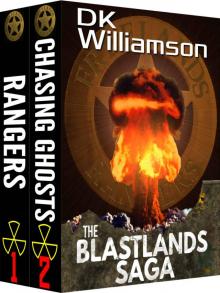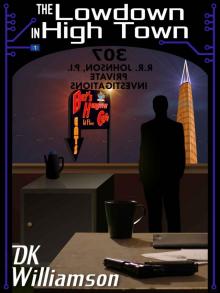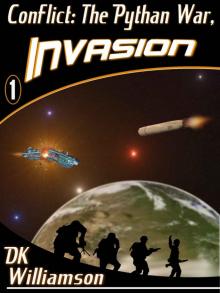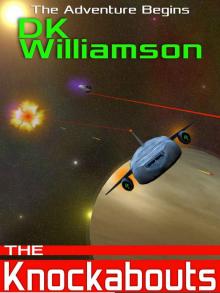- Home
- DK Williamson
The Lowdown in High Town: An R.R. Johnson Novel Page 3
The Lowdown in High Town: An R.R. Johnson Novel Read online
Page 3
“There are two bridges connecting the industrialplex with High Town. The West Bridge carries mostly ground trucks from the manufacturing and chemical plants. They take the vehicle lifts down to wherever it is they go to deliver whatever it is they haul. West Bridge Street is the unofficial eastern boundary of the Red Light.”
“That’s mostly industrial and warehousing near there, right?”
I smiled. “It should be, but there’s a few businesses and some residential units. Pretty shitty place to live, but if you want an affordable place, you might look over there.”
Blanc smirked. “Thanks a lot. How can people stand to live over there?”
“They can’t afford anything better, or simply don’t give a damn, if you call that living.”
“What about the East Bridge? Is it the same?”
“The East Bridge links the processing and chemical plants with the space elevator at the northeastern edge of High Town. There’s no residential areas over there. East Bridge Street runs near the police station, so if you get bored chasing criminals and doing reports you can watch trucks drive by.”
The kid glared at me.
“Not to worry. Not near as much traffic over there, and it’s straight from the bridge to the elevator, and vice versa.”
The elevator was the closest thing to manned space travel humanity had anymore except for the suborbital shuttles, but they were working to change that. The asteroids that were pulled into orbit years ago were mined by automated and remote controlled robots from the Counterweight Station way the fuck out in space, and the substances they mined were brought down to be processed. Some of the materials produced from those substances were returned to space via the elevator as parts for the spacecraft they were constructing. That particular week they were calling it the Astra Orion, but they changed the name every so often, especially after elections. It was anybody’s guess what they would call it when they finished the thing, if they finished the thing. Ten years they predicted. If they stayed on schedule, that would be the year 2250. I wasn’t holding my breath.
When we were finished eating we started the tour. I thought it best to walk him past most of the places he needed to see and give him a basic rundown of the who’s and what’s he needed to know. He needed to get acclimated before he started work. It would go fast and I didn’t want him getting overwhelmed his first night in the Red Light.
“You ready to walk?” I asked as we stepped outside into the balmy night.
“Sure, let’s go,” he said patting his stomach.
I steered the detective down the steps and we started up the sidewalk.
“Rick!” a voice yelled out behind us.
We turned and saw a twisted shape that used to be a man walking toward us. His hips were aimed about thirty degrees off kilter of where his upper body was pointed. His torso was bent far enough it formed a shallow C shape and his head was so misshapen it defied explanation. His name was John and he couldn’t walk a straight line if his life depended on it.
“Rick, Rick, Rick.”
“John, how are you?” I asked in a loud voice. John was hard of hearing.
“Good, Rick. Good. I’m good, Rick,” he replied in his customary halting speech.
“Great. This is Bob,” I said gesturing at the young detective. John didn’t care much for strangers, but once you introduced him to someone he figured they weren’t strangers anymore, so it was good to do the intros quick, before John got upset.
“Bob. I’m John. John. Our names rhyme. John. I’m gonna go eat. Skyline, Rick.”
“You got creds, John?” I asked. Sometimes he forgot he needed money of some sort to pay for meals.
“Creds? Scrip. Food for scrip. Got scrip. I’m hungry.”
“You go eat, John. We’ll catch you later.”
John didn’t say anything else. He just made his way into the Skyline, skittering like a beetle missing some of his legs.
“Who was that?” Blanc asked, trying not to be wide-eyed.
“That’s John, Twisted John, most call him.”
“What happened to him?”
“He was one of the very first victims of the cyberviruses when they appeared. Ran through a window because of the hallucinations, a twenty-second story window. He survived of course. They pieced him back together, cut out part of his brain, and sent him on his way.”
“The cyber plagues. Is he one of the near dead?”
Blanc was talking about the cybervirus survivors that suffered with serious brain issues, like fried synapses and worse. Not to say John didn’t have issues, but his were more from having his brain smashed on pavement and having it hacked at by doctors.
The cyberviruses wreaked havoc among those who had their brains wired for personality modules, add-on data plugs, and medical implants. Hundreds of thousands died or were severely brain-damaged. Just as many were injured to a lesser degree in one form or another. It was thought the cyber plagues, as they were commonly called, were a military weapon that was turned loose on the public, inadvertently or not. Others thought it was the work of a maniacal group or individual. No one knew, or at least no one was telling.
People of my generation were mostly not wireheads or chipheads as they were usually called. We were wary after seeing the carnage from the cyberviruses in our youth, but the members of the younger set nowadays are taking to the technology in droves. Supposedly, cyberviruses are not a threat to the new technologies.
I wasn’t willing to risk my grey matter and end up like John or the near dead, but many were willing to give it a go.
The near dead shambled around like zombies, although many of them lived somewhat normal lives. They could work and live on their own, but eventually their brains would degenerate to the point they would have to go to a care facility.
“No, John is not one of the near dead,” I said answering Blanc’s question. “He’s misshapen, walks funny, and he’s half-crazy, but who wouldn’t be after all that?”
“Is he dangerous?”
“No, except to himself sometimes.”
I took Blanc up and down the streets, pointing out the highlights and a few lowlights, trying to explain to him how things worked in the Red Light. There is no way I could show him everything in one night, especially since the kid said he needed to be up early in the morning, so we went fast. The Red Light didn’t get into full swing until a couple of hours after dark, but he got to see some of the things outsiders called crazy. If you were to ask residents of the place about it, they’d tell you what the outsiders called crazy wasn’t crazy at all, it was just night time in the Red Light.
The whirlwind tour covered the Jazz Hands Show Club, which was the kind of joint that hired men, women, and all sorts in between as performers. The locals nicknamed the place the Man Hands Show Club because the percentage of performers who were genetically female was very low.
There was Gogo’s Go-go-a-Go-go Go-go Club. I gave Blanc three guesses on what sort of club it was. He got it on the first try.
Another place was Flamingo Ray’s, which was a classic nightclub with dinner and drinks, musical performers, and scantily clad wait staff. The dress code was strict. It was a high-end joint with high-class clientele and a price tag to match.
The Crank Case and Dante’s were on the opposite end of the spectrum from Flamingo Ray’s. A couple of biker bars situated directly across the street from one another that between them accounted for more than a few unsolved murders every year. It was a mean scene three or four nights a week on average, with eyeballs on the floors and blood on the street, but the situation was not as bad as it once was.
A few years ago a scoo-jockey cut loose with a heavy blaster during a fracas between two gangs and hit the space elevator with one of his shots. It couldn’t have done any damage, but it prompted a rollout of a pair of the Security Forces armored personnel carriers from the space elevator contingent and that ended that.
Security Forces work for the Provost Marshal, not the police departmen
t. They were pros, not doughnut munching cops. Things became a little less lethal after that.
The Port o’ Call was a merchant seaman’s hangout, a pub owned and operated by a bear of a man named Frenchy Lafitte. It seemed odd that mariners from around the world would make the trip from the port up three hundred stories through the Midtown Megablock and the Sky Riser to the High Town District just to drink, but they did, sometimes by the hundreds.
Directly across from my office was Bat’s Hangover Café. It wasn’t the worst eatery around, but those that weren’t fans of overcooked eggs, stale donuts, and week old coffee found there wasn’t much else to recommend the place. The multicolored glow from the sign hanging off a pole above the street lit up my office at night, but it wasn’t so bad, I never had to buy a night light.
We walked past other businesses that were a little more mundane: car lots; casinos; mod and bod shops; chem shops; plug stores; body part growers, buyers, and sellers; and countless smaller clubs and bars.
By the time it was getting late we swung back to the main north-south drag, Houston Street. I wanted to take Blanc to see the best place in the Red Light, Pete’s Café Texian, situated near the edge of the pink zone.
A little over a block south of Pete’s was Ugemann’s Emporium of Delights and Esoterica.
Heed the siren’s call and enter a world of delight and wonder, the sign read. It wasn’t so delightful inside. It was a truly frightening freak show to anyone of common sense. Not surprisingly there were a lot of people lacking common sense, evidenced by the fact that Ugemann’s got a fair share of business.
As we neared the place we saw a trio of middle-aged women—tourists from the look of them—debating whether they should go in. They had no business being in the Red Light at this time of night, or any other time for that matter.
“You don’t want to go in there, ma’am,” I said to the women.
“Is it that bad?” one of them asked.
“No ma’am, it’s worse,” I said. It wasn’t a joke.
“Can you recommend some other attraction?” asked one of the other women.
Just then one of the denizens of Ugemann’s came out of the building. I couldn’t say exactly what he was wearing, but I was fairly certain it was not clothing. Paint was my guess, and it covered the erect and dangling parts, but it was still a bit much for the tourists. Quite a bit too much.
“Perhaps one of the dinner clubs a few blocks north, out of the Red Light might be more to your liking, ladies,” Detective Blanc said, ignoring the guy.
“That is sound advice,” I added.
“I believe we will do that. Thank you, sirs,” said one of the women, probably the least flustered of the trio. They hurried their way north.
As we watched the women, Blanc gestured at Ugemann’s and said, “What’s in there exactly?”
“I don’t know,” I answered, “but I’ve heard stories. If even the mild ones are true...”
“Now you’re just yanking my chain,” he said.
“Maybe. You’ll have to go in there and see for yourself. Just make sure you take something with a little more pop than that needler of yours,” I said with a grin. “C’mon, I got one last place to show you.”
I led Blanc up the block and into Pete’s Café Texian. It was everything a bar should be. Varnished hardwood bar top, a mirror behind the bar, a small dance floor and stage for musical acts, an area with tables and chairs, lighting of different brightness levels at different locales, and a top-notch selection of spirits, wines, beers, and chems. The bartenders were knowledgeable and skilled, and the place was clean.
Pete Langley ran the place, which was why it was called Pete’s. The bank still owned a big chunk of the joint, but it would be all his someday. Pete was the oldest friend I had.
This time of night, the place was always busy. I bored my way through the throngs of people to the bar and saw Pete was talking with someone toward the back. I looked over my shoulder and saw Blanc was still tagging along. “Follow me,” I said over the bar noise. I cut a path parallel to the bar right behind the barstools.
“Talk to the reflection, man. You keep talking through my head and you’re spitting in my ear,” I overheard from the central member of a trio of men seated at the bar. “There’s a reason they put mirrors behind bars and lunch counters. You know what that reason is? It’s so people like you can talk to someone down the bar without spitting on people like me,”
We pushed our way out of earshot.
“I don’t care how many homers he hits this year. With no pitching we ain’t going anywhere,” from a man talking to somebody farther down.
When I got closer to Pete, he noticed me and greeted me with a gesture of his head. The ramshackle guy he was talking with was wearing a desert camouflage parka. I figured him for a veteran.
“Evening, Rick,” Pete said. “Vet here,” he said pointing to the guy in the parka. “Vet, that’s Rick. He was a grunt like you in the First with me. Led the force at Salla Wadi at the end of the war.”
I glared at Pete for dredging up ancient history.
The guy glanced at me and gestured some kind of acknowledgement with his head, and then continued his conversation with Pete. Pete had seen and heard this a thousand times, down on their luck vets mooching drinks.
“You were a supply guy, huh?” the vet said to Pete.
“Yeah, that’s right,” Pete replied as he ran a white towel around the inside of a beer mug.
“You see any combat?”
“Sure. When we’d run weps, ammo, food, and fuel to the front and haul wounded and corpses back. Nothing like you guys, but, yeah.”
“Well, at least you got some honor,” the vet replied.
“Honor? What honor? It was honorable to see combat?” I said, cutting into the conversation.
“What does that mean? You said you were a grunt.”
“Pete said I was a grunt. Pete was a grunt too, but he was smart enough to take a supply job when it was offered. The rest of us were either too dumb to even get an offer for a job like that or foolish enough to turn it down when it was offered. ‘I want to be where the action is. I couldn’t live with myself if I didn’t serve on the front lines,’ we said. We were young and stupid and that’s what they look for in a grunt. Where is the honor in that?”
“Well, we did what they asked us to do.”
“Yeah. Like idiots who didn’t know any better. We lost the war because the Gulf Confederation under whose flag we fought went belly up and we walk around twenty years later talking about honor. There’s no honor in stupidity,” I replied.
Pete headed for the other end of the bar with a wave of his hand. He’d heard all this before.
“Maybe you’re right, but I still got my personal honor,” the vet said, sounding like he didn’t believe in what he was saying. “So you were in the First? I served in the Third Division.”
“What does that make us, buddies? They sent a half million of us over there. Maybe a hundred thousand of us are left. Does that mean all of us survivors got 99,999 buddies?”
“Well, no. But we sure chewed some of the same sand together, right?”
“Sure we did, but that doesn’t mean I’m buying you a drink either. Try your song and dance on someone with money. They might actually be impressed with your tale of woe.”
“Fuck you.”
“Now that’s what I expect from a fellow veteran,” I replied with a smile. “Fuck you also.”
I pushed through the crowd to the end of the bar, Blanc following. I signaled Pete.
“What you need, Rick?” he asked.
“This is Blanc. Detective Blanc,” I said throwing a thumb over my shoulder at the young cop. “He’s looking to clean up the Red Light.”
“Good to meet you, Detective,” Pete said offering his hand.
“Same here,” Blanc replied, shaking it.
“As long as you don’t hassle my customers, look for protection money, bribes, or free booze, you’re we
lcome here,” Pete said.
Blanc opened his mouth to reply, but I cut him off. “I don’t think you’ll have to worry about that, Pete. He’s a boy scout,” I said with a grin.
Pete glanced at the kid and smiled. “Strange, he doesn’t look stupid.”
“Gene steered him my way,” I said.
Pete leaned across the bar at Blanc. “Gene did a lot of good around here. If you can do the same you’ll earn a few friends, and more than a few enemies. Watch your tail.”
“Thanks. I will,” Blanc replied.
“The burnout, down the bar,” I said gesturing at the 3rd Division vet.
“What about him?” Pete asked.
“Get him a bottle,” I said as I slapped a twenty-cred scrip note on the bar top.
“You sure that’s what’s best for him?”
“What’s best for him would be to go back in time and kill the idiots that sent us over there in the first place, but until that day...”
“Yeah, yeah. Better off pickled than sorry. You’re just a big softy deep down inside,” he said sarcastically. “Sentimental even.”
“I know, but don’t tell anyone. And don’t tell the guy I bought him the bottle.”
“I know that. You think I don’t know that? Some fat cat that was just leaving bought it in thanks for his service.”
“Sounds about right, Pete. Later,” I said as I turned to leave. Pete raised his head and jutted his chin in my direction. I didn’t see him do it, but I know he always did.
“So, you know Pete from the war?” Detective Blanc asked in the comparative quiet outside as we left the bar.
“Yeah. He was as solid a guy as you could find.”
“When you said you were a grunt you meant—”
“Infantry.”
“So you saw combat.”
“I saw a lot of things, Detective,” I replied coldly.
“Why did you buy that guy booze if you disliked him so much?”
“I don’t dislike him. I didn’t like what he was saying. I paid for a bottle because the guy is still on his feet fighting, that’s why.”
“He’s a lush. He’ll die if he keeps that up.”

 The Blastlands Saga
The Blastlands Saga The Lowdown in High Town: An R.R. Johnson Novel
The Lowdown in High Town: An R.R. Johnson Novel Conflict: The Pythan War, Invasion
Conflict: The Pythan War, Invasion The Knockabouts
The Knockabouts